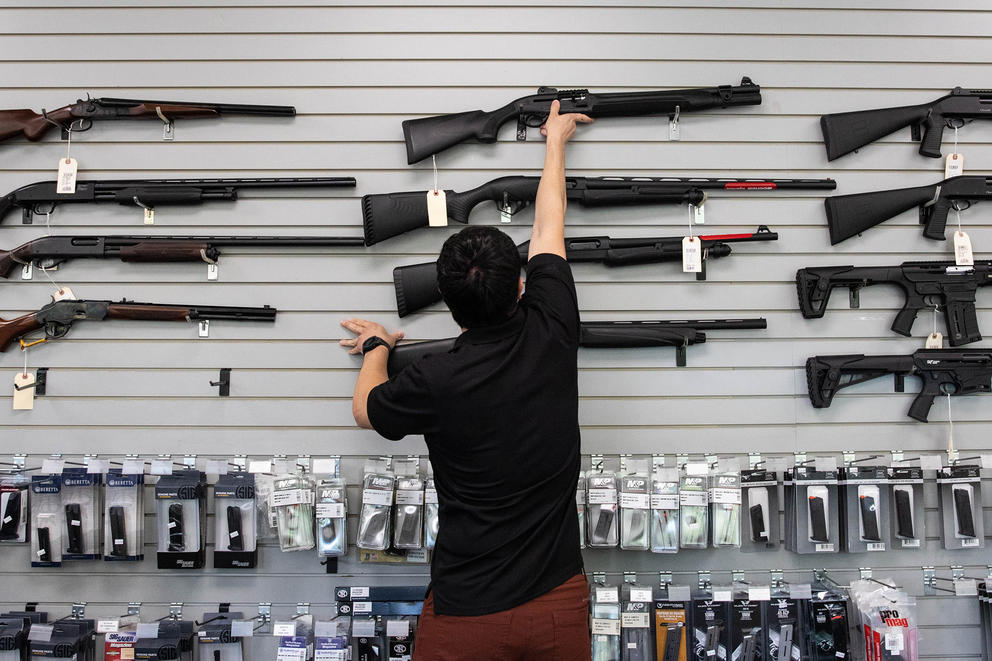That annual background-check provision – which was tucked inside a sweeping package of other gun regulations – is a unique idea to further strengthen firearms regulations. The existing background-check system generally screens people attempting to purchase guns and is tasked with keeping firearms away from those prohibited from possessing them under the law. That includes domestic abusers, individuals convicted of a felony, and those who have been civilly committed via the courts after mental-health episodes.
But the Inslee administration’s decisions on the new law were made so quietly that key advocates for firearms regulations – including the Alliance for Gun Responsibility, which put forth the 2018 ballot measure – were caught unawares. Some thought the law was delayed only until a new centralized background-check system housed at the Washington State Patrol goes live in 2024.
After Crosscut’s report was published, Alliance CEO Renée Hopkins emailed Inslee’s office and Democratic state lawmakers questioning the decision to put the law on hold, the beginning of a broader push to get the state to follow the law.
Now the governor’s office and the Washington State Patrol are working on a way to conduct annual checks, according to Hopkins and Inslee spokesperson Jaime Smith, and any needed legislation to execute the statute.
“We’re working on funding for WSP to implement a centralized system that will allow for re-checks, yes,” Smith wrote in an email. “However, to allow that system to complete a recheck beyond Washington only (i.e., catch records that originate from the feds or other states), we will need legislation and are working with folks on a licensing bill that would allow for the broader recheck.”
In a House Civil Rights and Judiciary Committee meeting on Friday, Kevin Baird, a Washington State Patrol official, told lawmakers that the agency now thinks it can conduct some form of annual checks.
“Initially the agencies determined there was neither a cost-effective nor efficient process to conduct these rechecks,” said Baird. But now that the new system is nearly complete, Baird added, “we believe we have a potential viable option to meet the intent of I-1639.”
Passed by 59% of state voters more than four years ago, Initiative 1639 did many things. It included a law to encourage secure gun storage, raised the purchase age to 21 for semiautomatic rifles and required more extensive background checks and a waiting period for people seeking to obtain those weapons. That last change made the process to buy a semiautomatic rifle about as rigorous as the existing regulations for buying a pistol.
But the law to implement background checks on owners of pistols and semiautomatic rifles poses logistical difficulties unlike the other parts of I-1639.
One reason is that current checks are centered around gun purchases using applications filled out when buying a firearm. The Department of Licensing is tasked with keeping some of that information on file, but neither the federal government nor Washington state keeps records on who actually owns guns.
That means that existing gun data from purchase records can’t account for someone who has died or moved out of state or gotten rid of their weapons, Beau Perschbacher, legislative and policy director for the department, said earlier this year.
“You're talking about millions of records that local law enforcement would have to search, and the cost of that was a major consideration,” he said at the time.
In September, Mike Faulk, a spokesperson for the governor’s office, also pointed to the difficulty of conducting checks through only the existing state databases, given that the FBI’s national criminal database is the main source of screening people purchasing guns.
“The governor would welcome the opportunity to work with the Legislature to identify a viable path forward to conduct these checks,” said Faulk.
Those explanations didn’t ease the concerns of the Alliance for Gun Responsibility. The afternoon that Crosscut’s report was published, Hopkins wrote to Inslee and his senior staffers saying the organization was “incredibly alarmed and surprised to read your office’s comments in this morning’s Crosscut piece,” according to the email obtained through a public records request.
“The quotes from your office seem at odds with your long-time commitment to gun violence prevention and appear to reflect a lack of concrete plan to implement the background re-check provisions passed by voters in 2018,” Hopkins wrote in the email, which was also sent to roughly three dozen state lawmakers.
“It is unacceptable that four years after the passage of this measure there is not a system — or even a plan — in place to allow Washington to perform annual rechecks to keep guns out of dangerous hands the way other states do,” she added.
In an interview last week, Hopkins said headway is now being made to get the law implemented: “I would say that the governor’s office and Washington State Patrol are definitely working on this and dedicated to getting it done.”



